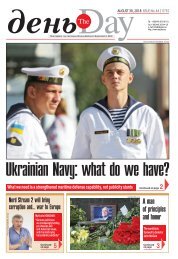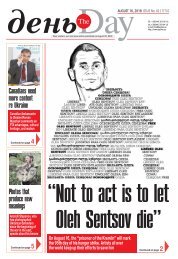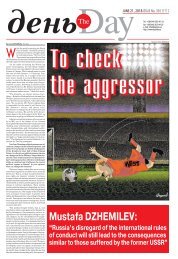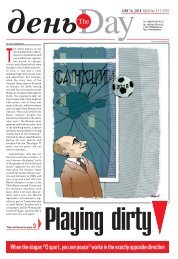36_ENG
Create successful ePaper yourself
Turn your PDF publications into a flip-book with our unique Google optimized e-Paper software.
WWW.DAY.KIEV.UA<br />
DAY AFTER DAY No.<strong>36</strong> JUNE 12, 2018 3<br />
By Andreas UMLAND<br />
The new German study “Die<br />
Ukraine in den Augen Deutschlands.<br />
Bilder und Wahrnehmungen<br />
eines Landes im<br />
Umbruch” (Kyiv: Buero fuer<br />
politische Kommunikation, GIZ<br />
GmbH, 2018. 111 pp.) carefully<br />
reflects a wide range of opinions<br />
held by German experts on the state<br />
of affairs in Ukraine and issues of its<br />
description, perception, understanding<br />
and misunderstanding in<br />
today’s Germany.<br />
Population and economy-wise,<br />
Germany is the most significant<br />
country in Central and Western Europe,<br />
while Ukraine, which has the<br />
largest area among exclusively European<br />
countries (some parts of<br />
Russia and Turkey lie in Europe,<br />
but most of them are in Asia), has<br />
turned into a geopolitically key<br />
state of East-Central Europe in the<br />
post-Soviet period. The Ukrainians<br />
and Germans have deep-rooted historical<br />
connections. One of such<br />
connections was the adoption of the<br />
famed Magdeburg Law by several<br />
Ukrainian cities in the 15th-19thcentury<br />
period. One of these cities,<br />
namely Kyiv, hosts a monument to<br />
the Magdeburg Law. In the post-Soviet<br />
period, Ukrainian-German cooperation<br />
in various fields of business,<br />
science, education, and culture<br />
has developed and continues to<br />
develop in a great variety of forms.<br />
In view of these and many other circumstances,<br />
it is surprising how little<br />
attention has been paid so far to<br />
the study of the relations and connections<br />
between the two major European<br />
peoples in the context of the<br />
study of European history and international<br />
relations.<br />
While the interest of Ukrainians<br />
in Germany has always been high,<br />
Germans have only recently begun<br />
to exhibit growing interest in<br />
Ukraine and information about it.<br />
In 2006, the Research Center for<br />
East European Studies at the University<br />
of Bremen began publishing<br />
a periodic electronic bulletin called<br />
Ukraine-Analysen, which has had<br />
201 issues so far. At present, two<br />
specialized German-language websites<br />
– Ukraine-Nachrichten (News<br />
about Ukraine, founded in Dresden<br />
in 2007) and Ukraine verstehen<br />
(Understanding Ukraine, launched<br />
in Berlin in 2017) – are also improving<br />
the understanding of Ukraine in<br />
Germany. The work on systematic<br />
interpretation of the history of German-Ukrainian<br />
relations is progressing<br />
as well, albeit at a slower<br />
pace. In 2010, Hamburg-based historian<br />
Frank Golczewski published<br />
a major work on German-Ukrainian<br />
relations in the interwar period<br />
(Deutsche und Ukrainer 1914-1939,<br />
Paderborn: Schoeningh, 1,058 p.).<br />
Since then, there have been several<br />
studies and papers on the presentation<br />
of Ukraine in the German media<br />
(including distortions in it), as<br />
well as Germany’s participation in<br />
the transformations in post-Soviet<br />
Ukraine.<br />
The Ukrainian program of the<br />
German Agency for International<br />
Cooperation (GIZ) offers an extremely<br />
informative and illuminating<br />
description of the German perspectives<br />
on today’s Ukraine in<br />
their new study “Ukraine through<br />
the German Eyes: Representations<br />
and Perceptions of a Country in the<br />
Transition Period.” The study is<br />
based on the methodology of the<br />
GIZ’s previous project of studying<br />
the perception of Germany in the<br />
world, during which international<br />
experts on Germany were asked to<br />
Krieg, Krise, Krim vs.<br />
Dynamo Kyiv and the Klitschkos<br />
A German study tries to determine which perception<br />
of Ukraine is prevailing in German society<br />
answer the question of how the German<br />
state was perceived in their<br />
homeland. The study of Ukraine<br />
conducted by the GIZ in 2017 is also<br />
not a statistical study of the Germans’<br />
attitude towards Ukraine,<br />
but a deep qualitative exploration<br />
of the impressions, interpretations,<br />
opinions, perspectives, assessments,<br />
stereotypes, knowledge and<br />
expectations that exist in Germany<br />
regarding Ukraine. This analysis is<br />
based on 1,014 statements by<br />
44 German citizens who are more or<br />
less familiar with Ukraine or are<br />
interested in it for various professional<br />
reasons. The respondents include<br />
researchers, businesspeople,<br />
civic activists, journalists as well<br />
as cultural and political figures.<br />
The latter category encompasses<br />
some well-known individuals, such<br />
as the Green Party’s Member of the<br />
European Parliament Rebecca<br />
Harms or former Prime Minister of<br />
Saxony and serving Ambassador of<br />
the G7 in Ukraine, Professor Georg<br />
Milbradt.<br />
As initiator and immediate<br />
leader of the project Andreas von<br />
Schumann clearly points out in his<br />
opening remarks, the objective of<br />
the study was not “to search for<br />
[objective] truth” about Ukraine.<br />
Rather, “[we] wanted to isolate the<br />
similarities that can be revealed in<br />
different views [on Ukraine] of different<br />
people [from Germany], to<br />
discover the outlines of these perceptions<br />
[and] recognizable features<br />
of both the real and distorted<br />
portrait of the country.” Von Schumann<br />
points out two fundamental<br />
trends in the assessments given by<br />
44 German participants in specialized<br />
interviews: firstly, the German<br />
experts questioned believe<br />
that the German “perspective on<br />
Ukraine is too narrow, the knowledge<br />
[of Ukraine in Germany] is too<br />
unsystematic, the attention of [the<br />
Germans] [to events in Ukraine] is<br />
too fickle, and assessments [of<br />
Ukrainian topics] are built on too<br />
shallow foundations.” Secondly,<br />
the German experts interviewed,<br />
according to von Schumann, expressed<br />
“a deep desire that Germany<br />
and the Germans find a common<br />
language with Ukraine more<br />
often and more actively.” This desire<br />
is based on several motives:<br />
the historical responsibility of the<br />
German people, the cultural diversity<br />
of Ukraine, the economic potential<br />
of the country, the need to<br />
ensure stability in eastern Europe<br />
and the possible incentives [flowing<br />
from such involvement] for the<br />
further development of the EU.<br />
And yet, as the respondents noted,<br />
the most obvious incentive for<br />
them was admiration brought by<br />
their own closer encounter with<br />
Ukraine. Regardless of the specific<br />
reason that put Ukraine forward as<br />
their principal interest, most [of<br />
the interviewees] stressed that the<br />
“clean sheet” of perception that<br />
had existed at first had quickly<br />
turned into a “colorful canvas”<br />
(page 7).<br />
As shown by the study, three<br />
negative ‘K’s have dominated the<br />
German perception of Ukraine since<br />
2014: Krieg, Krise, Krim – i.e., the<br />
[military] conflict, crisis, Crimea.<br />
Two other ‘K’s with positive connotations,<br />
which are the once famous<br />
soccer team Dynamo Kyiv and the<br />
The Queen’s record achievements<br />
How America and Canada were able<br />
to watch the coronation of Her Majesty<br />
which took place 65 years ago<br />
REUTERS photo<br />
REUTERS photo<br />
name Klitschko, borne by Vladimir<br />
and Vitalii, two famous world boxing<br />
champions who lived in Germany<br />
for a long time and are still<br />
popular in that country, have only<br />
slightly improved this image. The<br />
GIZ study not only presents widespread<br />
German stereotypes about<br />
Ukraine, similar to those described<br />
above, but also offers numerous indepth<br />
assessments of the scope of<br />
various perceptions in Germany of<br />
such Ukrainian topics as the 2014<br />
regime change, reforms, corruption,<br />
nationalism, external relations,<br />
European aspirations, cultural<br />
differences, relations with Russia,<br />
and the nation’s significance for<br />
Germany.<br />
The value of this study is not<br />
only in illustrating well the various<br />
German interpretations of these<br />
topics. Besides presenting the<br />
views of many leading German experts<br />
on Ukraine and their perspectives<br />
on the country they take interest<br />
in, the brochure also offers<br />
an in-depth presentation of how the<br />
German public should be informed<br />
in the future about the history and<br />
events in and around Ukraine.<br />
From the point of view of Germany’s<br />
importance for the EU’s<br />
foreign policy in general and for<br />
the Union’s policy towards Ukraine<br />
in particular, this study of the German<br />
thinking on various Ukrainian<br />
issues, which is now being translated<br />
into English and Ukrainian, will<br />
become mandatory reading for all<br />
those interested in the present and<br />
future of international relations of<br />
Ukraine, as well as its gradual European<br />
integration.<br />
Andreas UMLAND is an expert<br />
at the Institute for Euro-Atlantic<br />
Cooperation (Kyiv)<br />
By Natalia PUSHKARUK, The Day<br />
On June 2, Queen<br />
Elizabeth II celebrated<br />
65 years since her<br />
coronation, held at the<br />
Westminster Abbey on<br />
the same day in 1953. Then, thousands<br />
of guests witnessed the<br />
historic ascension of the 27-year-old<br />
Elizabeth to the throne, while<br />
11 million Britons listened to the<br />
event on radio, and 27 million<br />
watched it on TV. The CBS News<br />
writes that journalist Walter<br />
Cronkite was the first to broadcast<br />
the event in America, using an<br />
improvised studio in a hangar in<br />
Boston’s Logan Airport. Meanwhile,<br />
the Royal Central web<br />
resource reports that the Canadians<br />
and Americans were able to watch<br />
Elizabeth’s coronation on the same<br />
day as the British only because the<br />
BBC’s records of the events were<br />
transported across the Atlantic by<br />
Royal Air Force aircraft. Formally,<br />
Elizabeth assumed her duties as<br />
Queen on February 6, 1952, when<br />
she learned, while visiting Kenya,<br />
that her father, King George VI,<br />
had died. That is why the Sapphire<br />
Jubilee of Elizabeth II, marking<br />
65 years of her reign, was<br />
celebrated last year. The Express<br />
publication notes that there were no<br />
official celebrations for the<br />
coronation anniversary in Britain<br />
this year, and Elizabeth spent<br />
June 2 attending one of her favorite<br />
entertainments, the Epsom Derby.<br />
Pictured: Queen Elizabeth II<br />
with John Warren, Her Majesty’s<br />
horse caretaker.
















